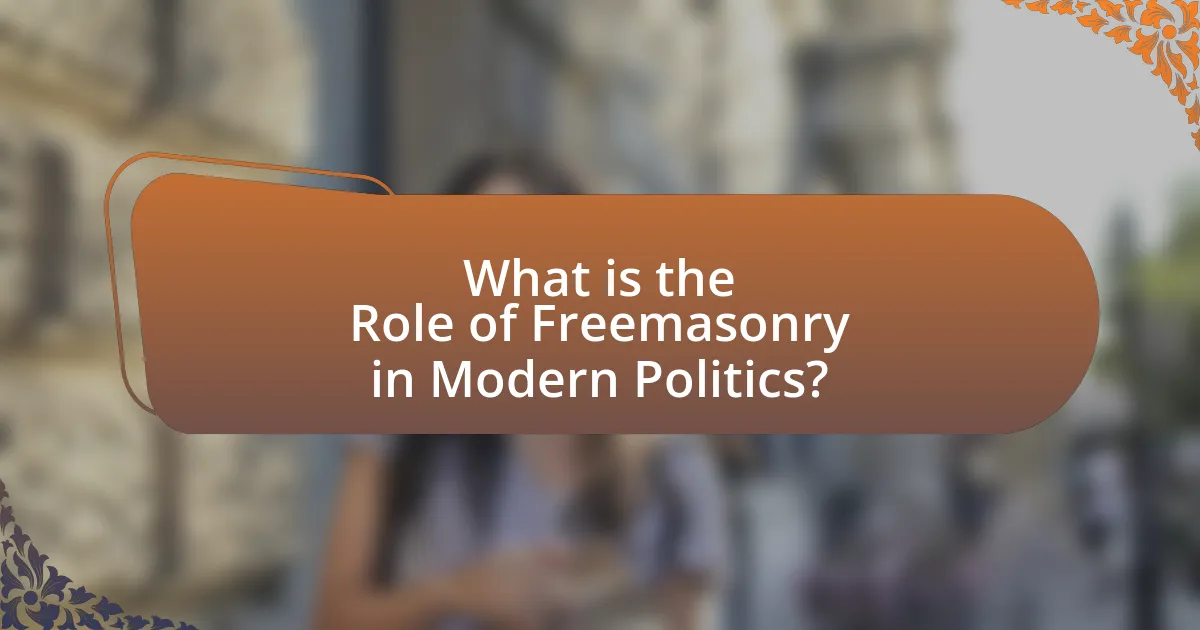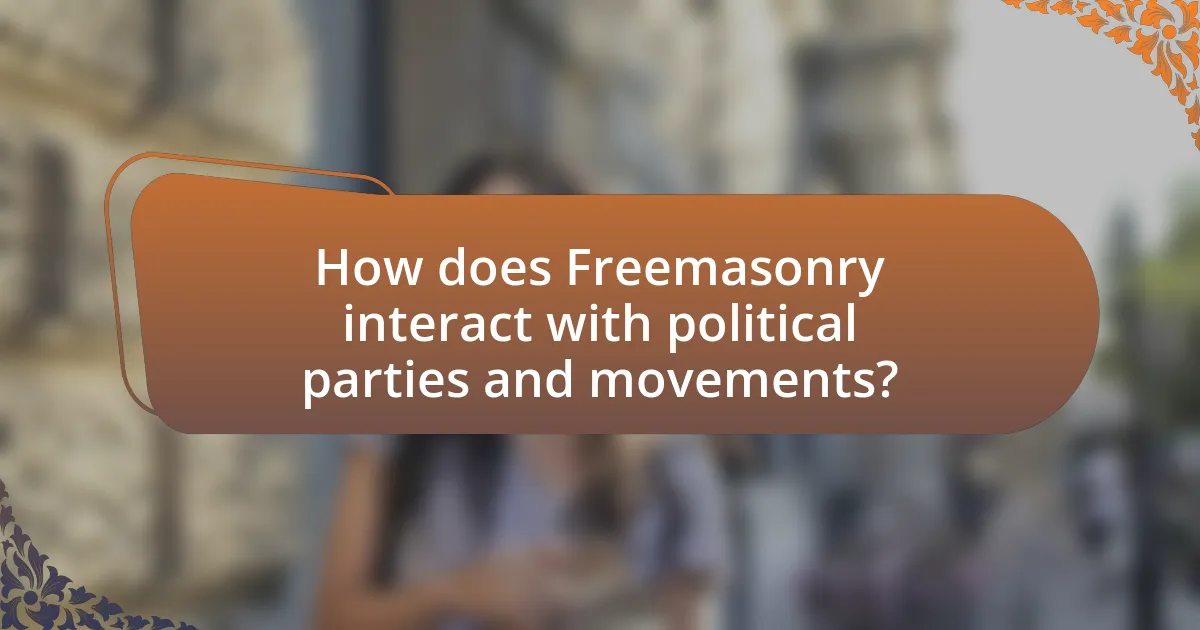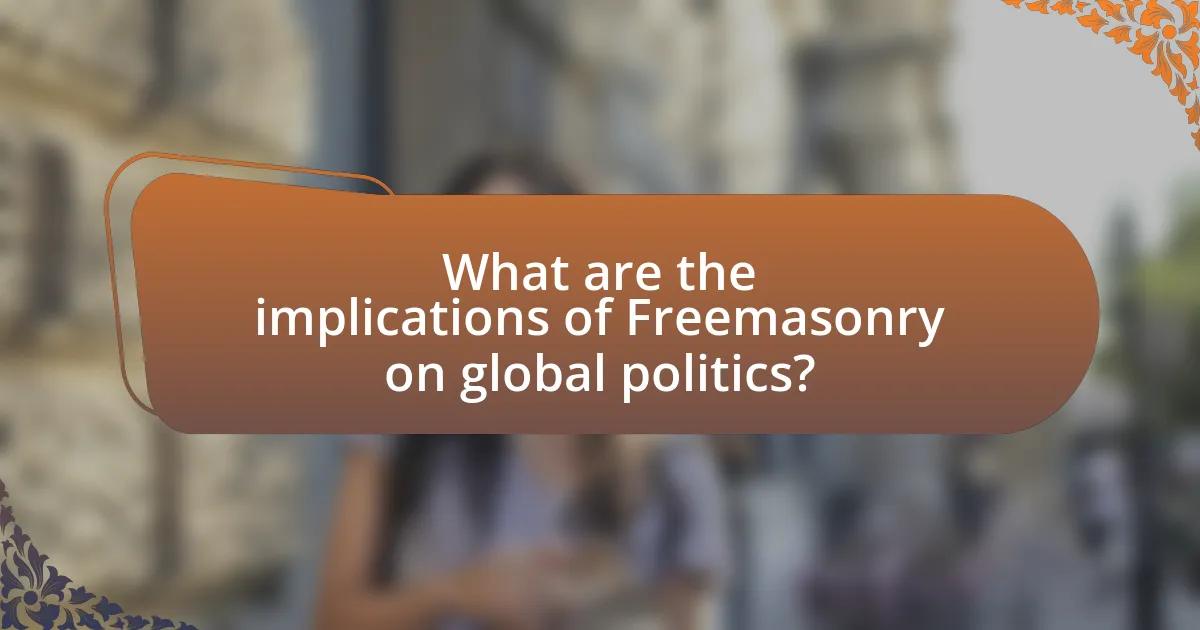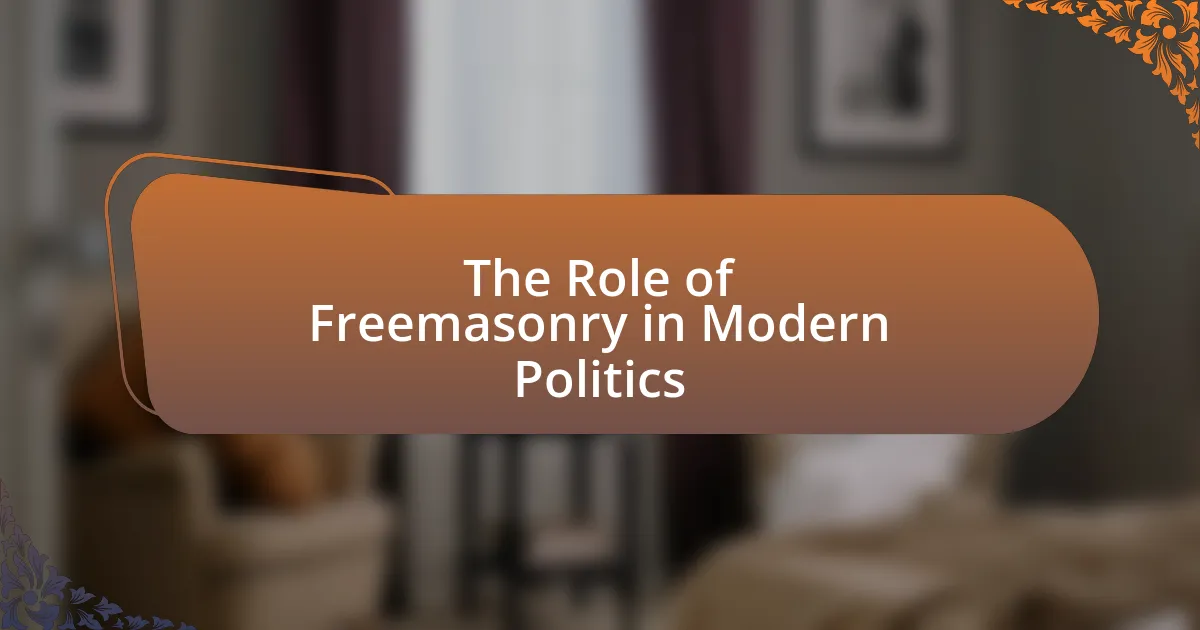Freemasonry plays a significant role in modern politics by influencing political thought and providing a network for political leaders. Historically, many prominent politicians, including George Washington and Franklin D. Roosevelt, have been Freemasons, which has facilitated the exchange of Enlightenment principles such as liberty, equality, and fraternity. The organization promotes civic engagement and philanthropy, encouraging members to participate in community service and public affairs, thereby impacting political landscapes. Additionally, Freemasonry’s emphasis on moral and ethical conduct influences political culture and decision-making, while its historical involvement in key political events, such as the American and French Revolutions, underscores its enduring relevance in shaping governance and political ideologies today.

What is the Role of Freemasonry in Modern Politics?
Freemasonry plays a significant role in modern politics by influencing political thought and providing a network for political leaders. Historically, many prominent politicians have been Freemasons, which has facilitated the exchange of ideas and values aligned with Enlightenment principles such as liberty, equality, and fraternity. For instance, notable figures like George Washington and Franklin D. Roosevelt were members, suggesting that Freemasonry has historically contributed to shaping political ideologies and governance. Additionally, Freemasonry promotes civic engagement and philanthropy, encouraging members to participate in community service and public affairs, which can indirectly impact political landscapes.
How has Freemasonry influenced political systems today?
Freemasonry has influenced political systems today by promoting principles of democracy, individual rights, and civic responsibility. Historically, many founding figures of modern democracies, such as George Washington and Benjamin Franklin, were Freemasons, which helped embed Masonic ideals into the political framework of nations like the United States. The organization has also fostered networks of influence among its members, facilitating collaboration and dialogue that can shape policy decisions. Additionally, Freemasonry’s emphasis on moral and ethical conduct has encouraged leaders to prioritize integrity in governance, impacting political culture.
What historical events showcase Freemasonry’s political involvement?
Freemasonry’s political involvement is prominently showcased in events such as the American Revolution and the French Revolution. During the American Revolution, many Founding Fathers, including George Washington and Benjamin Franklin, were Freemasons, and their Masonic principles influenced the formation of democratic ideals and governance. In the French Revolution, prominent figures like Marquis de Lafayette, who was a Freemason, played significant roles in advocating for liberty and equality, reflecting Masonic values. These events illustrate how Freemasonry has historically intersected with political movements, shaping the course of modern governance.
How do Freemasonic principles align with modern political ideologies?
Freemasonic principles align with modern political ideologies through their emphasis on individual liberty, equality, and fraternity. These core tenets resonate with democratic values, promoting social justice and civic responsibility. Historically, Freemasonry has influenced political movements advocating for civil rights and secular governance, as seen in the Enlightenment era when Masonic thinkers contributed to the development of liberal democracy. The principles of tolerance and rational discourse within Freemasonry also support pluralism, which is a foundational aspect of contemporary political systems.
Why is Freemasonry considered a significant factor in political networks?
Freemasonry is considered a significant factor in political networks due to its historical influence on political leaders and its emphasis on fraternity, ethics, and civic responsibility. Throughout history, many prominent political figures, including U.S. Presidents and European leaders, have been Freemasons, which has facilitated connections and collaborations among members in governance. For example, research indicates that a substantial number of American Founding Fathers were Freemasons, which helped shape the political landscape of the United States. This network fosters mutual support and shared values, allowing members to navigate political systems effectively and influence policy decisions.
What are the key characteristics of Freemasonic political engagement?
Freemasonic political engagement is characterized by a commitment to moral and ethical principles, a focus on civic responsibility, and the promotion of social justice. Freemasons often engage in political discourse to advocate for values such as equality, liberty, and fraternity, which align with their foundational beliefs. Historically, Freemasonry has influenced political movements and reforms, as seen in the Enlightenment period, where many prominent political leaders were Freemasons advocating for democratic ideals. This engagement is typically non-partisan, emphasizing the importance of individual conscience and collective action over party affiliation.
How do Freemasons build alliances within political spheres?
Freemasons build alliances within political spheres through networking, shared values, and mutual support among members. They often leverage their connections to influence political decisions and policies by promoting candidates who align with their principles. Historical evidence shows that prominent political figures, such as U.S. Presidents George Washington and Franklin D. Roosevelt, were Freemasons, which illustrates the organization’s historical involvement in politics. Additionally, Freemasonry encourages collaboration among its members, fostering relationships that can lead to political endorsements and support during elections. This strategic networking allows Freemasons to create a significant impact on political landscapes.
What controversies surround Freemasonry’s role in politics?
Freemasonry’s role in politics is surrounded by controversies primarily due to allegations of secrecy, elitism, and undue influence on governmental affairs. Critics argue that the secretive nature of Masonic meetings and rituals fosters an environment where members can exert influence without accountability, leading to potential conflicts of interest. Historical instances, such as the involvement of Freemasons in the founding of the United States, have fueled suspicions about their impact on political decisions. Additionally, conspiracy theories often link Freemasonry to broader agendas, such as the New World Order, further complicating public perception. These controversies are underscored by the fact that numerous political leaders have been identified as Freemasons, raising questions about transparency and the integrity of democratic processes.
How do conspiracy theories impact public perception of Freemasonry?
Conspiracy theories significantly distort public perception of Freemasonry by fostering mistrust and suspicion. These theories often portray Freemasonry as a secretive organization with hidden agendas, leading to negative stereotypes and misconceptions among the general populace. For instance, historical claims linking Freemasonry to various political conspiracies, such as the French Revolution or the establishment of the United States, have perpetuated the belief that Freemasons wield disproportionate influence in political affairs. Research indicates that such narratives can lead to increased social stigma and a decline in public support for Freemasonry, as individuals may view its members as untrustworthy or manipulative.
What are the ethical implications of Freemasonry in political decision-making?
The ethical implications of Freemasonry in political decision-making include concerns about transparency, potential conflicts of interest, and the influence of secretive networks on public policy. Freemasonry, as a fraternal organization, often operates behind closed doors, which raises questions about accountability in political processes. For instance, the historical involvement of Freemasons in governance has led to allegations of favoritism and the prioritization of Masonic interests over public welfare. Additionally, the lack of disclosure regarding Masonic affiliations can undermine public trust in elected officials, as citizens may question whether decisions are made in the best interest of the community or in service to Masonic agendas. This duality of private allegiance versus public duty creates a complex ethical landscape that challenges the integrity of democratic institutions.

How does Freemasonry interact with political parties and movements?
Freemasonry interacts with political parties and movements primarily through its members, who often hold influential positions within various political spheres. Historically, many prominent politicians have been Freemasons, which has led to the perception that Freemasonry can shape political agendas and influence governance. For instance, in the 18th and 19th centuries, Freemasons played significant roles in the establishment of democratic institutions in Europe and the Americas, advocating for principles such as liberty and equality. This historical involvement illustrates how Freemasonry has been intertwined with political movements, particularly those aligned with Enlightenment ideals. Additionally, Freemasonry promotes values such as tolerance and civic responsibility, which can resonate with political parties that prioritize social justice and community engagement.
What role do Freemasons play in political party structures?
Freemasons often play a significant role in political party structures by providing networking opportunities and influencing political decisions. Historically, many prominent political leaders have been Freemasons, which has facilitated the integration of Masonic values and connections into political frameworks. For instance, in the United States, several founding fathers, including George Washington and Franklin D. Roosevelt, were Freemasons, which underscores the organization’s historical influence on governance. Additionally, Masonic lodges can serve as informal meeting spaces for political discussions, thereby impacting party agendas and candidate selections. This interplay between Freemasonry and politics highlights the organization’s potential to shape political landscapes through its members’ involvement in party structures.
How do Freemasons influence party platforms and policies?
Freemasons influence party platforms and policies primarily through networking and the sharing of ideas among members who hold political office. This influence manifests in the promotion of values such as individual liberty, social responsibility, and community service, which can shape party agendas. Historical evidence shows that many prominent political figures, including U.S. Presidents like George Washington and Franklin D. Roosevelt, were Freemasons, indicating a legacy of Masonic involvement in governance. Additionally, Freemasonry’s emphasis on moral and ethical conduct can lead to the endorsement of policies that align with these principles, thereby impacting legislative priorities and party positions.
What examples exist of Freemasons in prominent political positions?
Prominent political figures who have been Freemasons include George Washington, the first President of the United States, and Franklin D. Roosevelt, the 32nd President. Additionally, Winston Churchill, the British Prime Minister during World War II, was also a member. These individuals held significant influence in their respective countries and were known for their Masonic affiliations, which often played a role in their social and political networks. Historical records confirm their membership in Masonic lodges, highlighting the organization’s impact on their leadership and decision-making processes.
How do Freemasonic values shape political activism?
Freemasonic values shape political activism by promoting principles such as brotherhood, equality, and moral integrity, which encourage members to engage in civic duties and advocate for social justice. These values foster a sense of community and responsibility among Freemasons, motivating them to participate in political processes that align with their ethical beliefs. Historically, Freemasonry has influenced political movements, as seen in the American Revolution, where many founding fathers were Freemasons who emphasized liberty and equality. This historical context illustrates how Freemasonic ideals have been integral in shaping democratic principles and encouraging political engagement among its members.
What causes do Freemasons typically support in the political arena?
Freemasons typically support causes that promote civic responsibility, social justice, and charitable initiatives in the political arena. This support is often reflected in their advocacy for education, community service, and the protection of individual rights. Historically, Freemasonry has emphasized the importance of moral and ethical behavior, which aligns with their backing of legislation that fosters equality and community welfare. For instance, many Masonic lodges engage in philanthropic activities that address social issues, such as poverty alleviation and healthcare access, demonstrating their commitment to improving society through political engagement.
How do Freemasons mobilize for social change through politics?
Freemasons mobilize for social change through politics by leveraging their networks to influence legislation and public policy. They engage in advocacy efforts that align with their values, such as promoting education, charity, and community service. Historical examples include their involvement in the establishment of public education systems and support for civil rights movements, demonstrating their commitment to societal improvement. Additionally, Freemasons often participate in political discussions and forums, providing a platform for members to voice their perspectives on social issues, thereby amplifying their impact on political processes.

What are the implications of Freemasonry on global politics?
Freemasonry has significant implications on global politics, primarily through its influence on political leaders and the promotion of liberal values. Historically, many prominent political figures, including U.S. Presidents like George Washington and Franklin D. Roosevelt, were Freemasons, which facilitated the spread of Enlightenment ideals such as democracy, individual rights, and secular governance. This network of influential members has often led to the establishment of policies that align with Masonic principles, fostering a culture of fraternity and mutual support among members that can extend into political spheres. Additionally, Freemasonry’s emphasis on moral and ethical conduct has contributed to the shaping of political discourse, encouraging transparency and accountability in governance.
How does Freemasonry affect international relations?
Freemasonry affects international relations by fostering networks of influence among its members, who often occupy significant positions in government and business. These connections can facilitate diplomatic dialogue and collaboration across borders, as seen in historical instances where Masonic leaders have played key roles in peace negotiations, such as the Treaty of Paris in 1783, which ended the American Revolutionary War. Additionally, Freemasonry promotes values of tolerance and fraternity, which can contribute to more amicable international relations by encouraging mutual respect among diverse cultures.
What role do Freemasons play in diplomatic circles?
Freemasons play a significant role in diplomatic circles by fostering networks of influence and facilitating communication among leaders. Historically, many prominent politicians and diplomats have been Freemasons, which has allowed the organization to serve as a platform for informal discussions and relationship-building. For example, notable figures such as Franklin D. Roosevelt and Winston Churchill were members, illustrating how Masonic connections can enhance diplomatic relations. These networks often promote shared values of tolerance, charity, and mutual respect, which can contribute to more effective diplomacy.
How do Freemasonic networks facilitate global political collaboration?
Freemasonic networks facilitate global political collaboration by providing a structured platform for influential individuals to connect and share ideas across borders. These networks often consist of members from various political, economic, and social backgrounds, allowing for the exchange of perspectives and strategies that can influence policy-making. Historical examples include the role of Freemasons in the American and French Revolutions, where members collaborated to promote Enlightenment ideals and democratic governance. Additionally, the existence of lodges in multiple countries fosters international relationships, enabling members to leverage their connections for political advocacy and support on global issues.
What challenges does Freemasonry face in modern political contexts?
Freemasonry faces several challenges in modern political contexts, primarily including public perception, political polarization, and legal scrutiny. Public perception issues arise from historical associations with secrecy and conspiracy theories, which can lead to mistrust among the general populace and political figures. Political polarization complicates Freemasonry’s ability to engage with diverse political ideologies, as members may hold differing views that can create internal conflict. Additionally, legal scrutiny has increased, with some jurisdictions questioning the organization’s influence on political decisions and transparency, leading to calls for greater accountability. These challenges impact Freemasonry’s ability to operate effectively within the political landscape.
How do changing societal values impact Freemasonry’s political relevance?
Changing societal values significantly impact Freemasonry’s political relevance by altering public perceptions and expectations of the organization. As societal norms shift towards inclusivity and transparency, Freemasonry faces pressure to adapt its traditionally secretive practices and exclusive membership criteria. For instance, the increasing emphasis on diversity has led many lodges to reevaluate their policies regarding gender and race, which can enhance or diminish their appeal in contemporary political discourse. Historical evidence shows that Freemasonry’s influence peaked during periods of societal alignment with its values, such as the Enlightenment, while declining when societal values diverged, as seen in the 20th century when anti-Masonic sentiments grew in response to changing political landscapes. Thus, the evolution of societal values directly correlates with Freemasonry’s ability to maintain political relevance.
What strategies can Freemasonry adopt to remain influential in politics?
Freemasonry can adopt strategies such as fostering political engagement among its members and promoting civic education to remain influential in politics. By encouraging members to participate actively in political processes, such as voting and running for office, Freemasonry can ensure that its values and perspectives are represented in governance. Additionally, organizing workshops and discussions on political issues can enhance members’ understanding of civic responsibilities and the political landscape. Historical examples, such as the involvement of Freemasons in the founding of democratic institutions in the United States, demonstrate the effectiveness of such strategies in shaping political discourse and policy.
What practical steps can individuals take to understand Freemasonry’s political role?
Individuals can take several practical steps to understand Freemasonry’s political role. First, they can read foundational texts and historical documents related to Freemasonry, such as “The Secret History of Freemasonry” by Paul Naudon, which provides insights into its influence on political structures. Second, attending local Masonic meetings or public lectures can offer firsthand experience and understanding of the organization’s current activities and political engagements. Third, engaging with scholarly articles and research studies, such as “Freemasonry and the Politics of the Enlightenment” by David Stevenson, can provide a critical analysis of Freemasonry’s historical and contemporary political impact. Lastly, participating in discussions on online forums or social media groups dedicated to Freemasonry can facilitate knowledge exchange and diverse perspectives on its political role.
